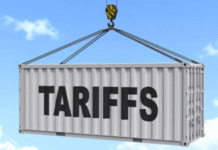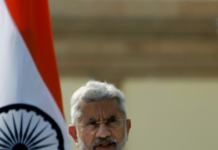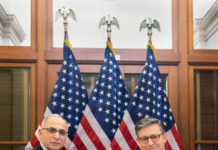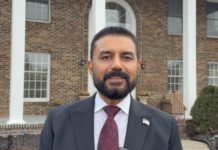WASHINGTON, D.C. — Two members of the U.S. House of Representatives have introduced a bipartisan resolution aimed at reaffirming the strategic importance of the U.S.-India partnership and reinforcing shared democratic and security priorities.
Representatives Ami Bera, a Democrat from California, and Joe Wilson, a Republican from South Carolina, led the effort, unveiling the resolution on Monday with the backing of 24 original cosponsors. The coalition includes lawmakers such as Sydney Kamlager-Dove, Rich McCormick, Deborah Ross, Rob Wittman, Suhas Subramanyam, and Jay Obernolte, reflecting strong bipartisan support.
The resolution underscores the shared commitment to combating terrorism, calling for “continued cooperation on counterterrorism, including the swift prosecution of the perpetrators of the 2008 Mumbai terror attacks.” It also referenced the April terrorist attack in Pahalgam, which claimed 26 lives and was “claimed by The Resistance Front (a proxy of Lashkar-e-Taiba), highlighting the persistent threat of cross-border and proxy terrorism in South Asia.”
Lawmakers emphasized that support for deepening ties with India has consistently crossed party lines and spanned multiple presidential administrations.
“For more than three decades, it has been the policy of the United States under administrations of Presidents Clinton, Bush, Obama, Trump, and Biden to strengthen the strategic partnership with India, recognising its importance to regional stability, democratic governance, economic growth, and shared regional priorities,” the resolution stated.
The measure also highlighted India’s role in the Quad, a strategic forum comprising the United States, India, Japan, and Australia, central to Washington’s Indo-Pacific strategy. The resolution urged both countries to “continue and expand cooperation for a free, open, and resilient Indo-Pacific, including through the Quad.”
It also welcomed India’s participation in bilateral and multilateral economic initiatives and encouraged greater collaboration in areas including technology, energy security, and people-to-people ties.
The bipartisan initiative comes just weeks after five U.S. lawmakers sent a letter to President Donald Trump, urging reconsideration of a September 19 proclamation affecting H-1B visa policies. They argued that the changes could harm the U.S.-India relationship.
“Although 75% of current H-1B visa recipients come from India, the program still needs to be enhanced and increased rather than limited to a select amount of people or corporations that can pay exorbitant amounts of money to get a visa,” the letter stated. The letter was co-signed by Representatives Jimmy Panetta, Ami Bera, Salud Carbajal, Derek Tran, and Congresswoman Julie Johnson. (Source: IANS)












